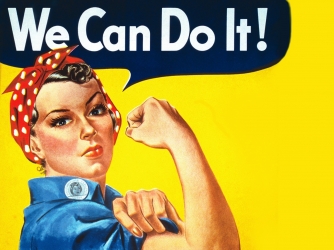A Raisin in the Sun by Lorraine Hansberry comprises of a myriad of representations of feminism. The female characters of the play are not completely the traditional, American types of women. Mama, Ruth, and Beneatha each manifest feministic qualities that venture away from the stereotypes that many individuals have about females in 20th-century America.
Beneatha, an aspiring medical school student, boldly states “Listen, I’m going to be a doctor. I’m not worried about who I’m going to marry yet-- if I ever get married” (50). Unlike the average view of an American woman, Beneatha takes on the challenge of completing medical school to become a doctor. Although she has Asagai in her life for some time, her choosing to earn an education supports the argument that women do not need men to be successful in life and that women can do the same things as men. Her view on opportunity can be linked to Betty Friedan’s The Feminine Mystique http://nationalhumanitiescenter.org/ows/seminars/tcentury/FeminineMystique.pdf
Ruth is an individual who portrays the typical role of a woman in a relationship as she sits home and cooks and cleans for the Younger’s household. In contrary to the homemaking role that she is labeled with in the play, Ruth is also a house servant to wealthy people: “I can’t stay home…. I got to go in. We need money,” (42-43). This defies the view of women not being capable of performing jobs outside of their household.
In terms of Mama, her assertiveness serves as an accurate example of how Hansberry uses feminist representations in her female characters. When talking about Beneatha’s future, she puts her foot down and ensures the family that money would be put away for her tuition: “...ain’t nothing gonna touch that part of it. Nothing” (44).

I agree! Beneatha also displays feminism when she cuts off her hair. Though it is not traditional for women her age to have such short hair, Beneatha adheres to her own values, as opposed to those commonly set for women in her time. These feminist traits set Beneatha apart from other characters written during her time.
ReplyDeleteThis comment has been removed by the author.
ReplyDelete